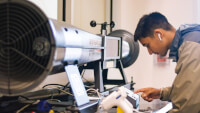

Australia is a popular destination for Indian students to continue their undergraduate and postgraduate education. But what does it take to get a student visa to study Down Under?
Let’s walk through the student visa process for Australia and what you need to know.
The path to studying overseas is unique to every student. It is always best to contact an immigration specialist or the embassy of the country you want to study in for advice. They can provide you information relevant to your circumstance and needs. While this article can shed light on the process to get a student visa in Australia, it is not intended to be advice on how to complete an application or a guarantee for visa approval.
The Australian student visa application can be completed online through the Australian Government’s immigration website.
But first, you have to be eligible to apply. To qualify for an Australian student visa you must:
The program of study you apply for must be in the Australian Commonwealth Register of Institutions and Courses for Overseas Students (CRICOS). You can search the CRICOS website to verify your program or university’s eligibility in CRICOS.
If you are applying to study at a secondary school up to Class 12 in Australia, you must meet the age requirements as laid out by the Australian governmentto apply.
| 🩺 Indian students are likely to be required to get a health examination as part of the visa application. This is particularly needed for students that intend to stay more than 6 months in Australia. |
|---|
You are also required to have health insurance for your stay before you arrive in Australia. Australia has a provision for Overseas Student Health Coverage (OSHC) for foreign nationals who study in Australia. Your OSHC must be valid before you arrive physically in the country, regardless of your visa or program start date.
Indian students may also be required to provide biometric information such as fingerprints as part of your application. You will be notified by the Australian Immigration Authorities whether biometric information will be needed after submitting your application.
There is only one type of Australian student visa, but its conditions and length of stay is dependent upon your program of study. Students that have a program that is 10 months or longer can typically stay 1-2 months beyond their program completion date. Postgraduate research students can traditionally stay an additional 6 months.
A student visa for Australia has certain conditions to maintain validity and eligibility while in the country. Here is what you can and can’t do with an Australian student visa¹:
| Do’s ✅ | Don’ts ❌ |
|---|---|
| Study in Australia through a qualified educational program | Get a study visa for a course that is not on the Commonwealth Register of Institutions and Courses for Overseas Students (CRICOS) |
| Stay in the country for the length of your program | Get a student visa for more than 5 years |
| Work up to 40 hours every 2 weeks during term | Stay on your study visa if you have de-enrolled from your intended program |
| Enter and leave Australia during term | Turn your existing study visa into a permanent visa |
| Include family members on your application | Extend your visa using time you’ve spent outside of Australia |
The Australian student visa process and submission is completely online. But you may have to collect documents, such as your health examination and biometrics, in person from local Indian providers. The local providers will have to be from the recommended list provided through ImmiAccount.
Here is a helpful step by step breakdown for what to expect when completing your Australia student visa application:
You will be notified by the Australian authorities if you have been granted a student visa or refused one. If you have been approved, you will receive in writing:
If you are refused an Australian student visa, you will be informed on why it was rejected and if there is scope to review the decision.
| 💡 It is suggested to start your Australian visa process a minimum of 6 weeks before the start of your course, but the earlier the better in general.² |
|---|
Before you start your student visa application, learn more about what is required for a successful visa submission.
As part of your visa application, you will be required to show evidence of being able to pay tuition, flights back and forth from India to Australia, and support your living and stay expenses for 12 months while in Australia. This also goes for any family members that are accompanying you and are on your visa.
If your parents or spouse are supporting you during your studies, they need to show an annual income of the following:
| Type of student | Minimum income to show |
|---|---|
| Single student | AUD$ 60,000/ ₹34,04,400 |
| Student with family members | AUD$ 70,000/ ₹39,71,800 |
*All INR prices shown are converted at the mid-market exchange rate of AUD $1 = ₹56.74 as of May 13, 2021
For the evidence of financial requirements you will need to provide, check with the university or school you are enrolled in. Additionally, you can check what you will need from your specific institution online with the Document Checklist Tool.
🚦 Keep an eye on the Australian government website for financial requirement evidence, as the website is updated with any changes in March and September of every year. ³
The documents that you are required to submit alongside your application varies depending on the institution you are applying to.
The Document Checklist Tool can be a helpful aid to ensure that you have all your documents ready before you start your application. Just input the country from which you have your passport and identify the Australian institution you have enrolled in.
Here are the major documents you may need to show as part of your application:
You may be asked for additional documents such as a health exam or evidence of your academic or employment background.⁴
| ⭐ As part of your application, you will need to sign the Australian Values Statement, which means that you will abide by Australian laws and respect the Australian way of life during your stay. |
|---|
Australia is quite clear on processing times for successfully completed and submitted visa applications.
For higher education, the visa processing time looks like:
For postgraduate research students, the processing time looks like:
Keep in mind the processing times when you are looking to apply and give yourself ample time to get everything you need. The processing time can be longer if your application is not completed correctly or additional documents are needed from you. On top of that, if you haven’t paid your application fee, your application will not be processed.⁵
The Australia student visa application fee is AUD$ 620. This fee is per application, so if you are traveling with family members, you will have to pay the total fee per number of applications. Family members have a reduced application fee:
| Application Fee in Australian Dollars | Application Fee in Indian Rupees | |
|---|---|---|
| Family member over 18 years old | AUD$ 460 | ₹26,100 |
| Family member under 18 years old | AUD$ 150 | ₹8,511 |
You can pay for the application in ImmiAccount by:
💳 Mastercard, Visa and American Express cards carry an additional surcharge of 1.4%. Your application fee can not be paid in parts and can not be split over different credit cards. It must be paid for in one go. To be prepared, ensure your Indian debit or credit card is able to do international payments before making the payment.
If you are unsure of what you may have to pay for your visa, the Visa Pricing Estimator is a handy tool to help estimate your costs.⁶
How much does an Australian student visa cost for Indian students? Let’s take a look.
| Australian Dollars | Indian Rupees | |
|---|---|---|
| Application Fee | $620 | ₹35,177 |
| Card Surcharge | $86.80 | ₹4,925 |
| Total | $706.80 | ₹40,102 |
Wise makes sending money abroad fast, simple and clear.
With a free Wise account you can send money directly to local bank accounts abroad- all from from your Android/ iOS app. Wise has only one transfer fee and you get the real exchange rate on every transfer abroad. No surcharges or extra fees here.
And if you are already in Australia, get a Wise account and card today to send, spend and receive money the easy and secure way. A Wise account works like a digital wallet that lets you spend money like a local in over 65 currencies.
Join the over 10 million people around the world that use WIse to send global money transfers.
| 🖨 If you found this guide helpful or want to refer to it later, right click on the screen and click ‘Print’, then save it as a PDF |
|---|
Sources
*Please see terms of use and product availability for your region or visit Wise fees and pricing for the most up to date pricing and fee information.
This publication is provided for general information purposes and does not constitute legal, tax or other professional advice from Wise Payments Limited or its subsidiaries and its affiliates, and it is not intended as a substitute for obtaining advice from a financial advisor or any other professional.
We make no representations, warranties or guarantees, whether expressed or implied, that the content in the publication is accurate, complete or up to date.

Living Abroad
Complete guide to Bank of India - New Zealand branch services catering towards NRIs based in NZ. Plus tips on how to save when remitting to India with Wise.

Living Abroad
Complete guide to Bank of Baroda - New Zealand branch services catering towards NRIs based in NZ. Plus tips on how to save when remitting to India with Wise.

Living Abroad
Learn how NRIs can vote in India's 2024 elections in our guide to voting for Indians living abroad.

Living Abroad
Complete guide to education loans available for Indian students pursuing higher studies abroad. Read on to go over the available options & general requirements.

Living Abroad
Avanse provides loan to Indian student to help finance their higher studies abroad. Read on to learn more about how to apply and what you need to know before.

Living Abroad
Complete guide to Leap Finance study abroad loans for Indian student pursuing MS in US. Read on to learn how to apply and what you need to know before you do.